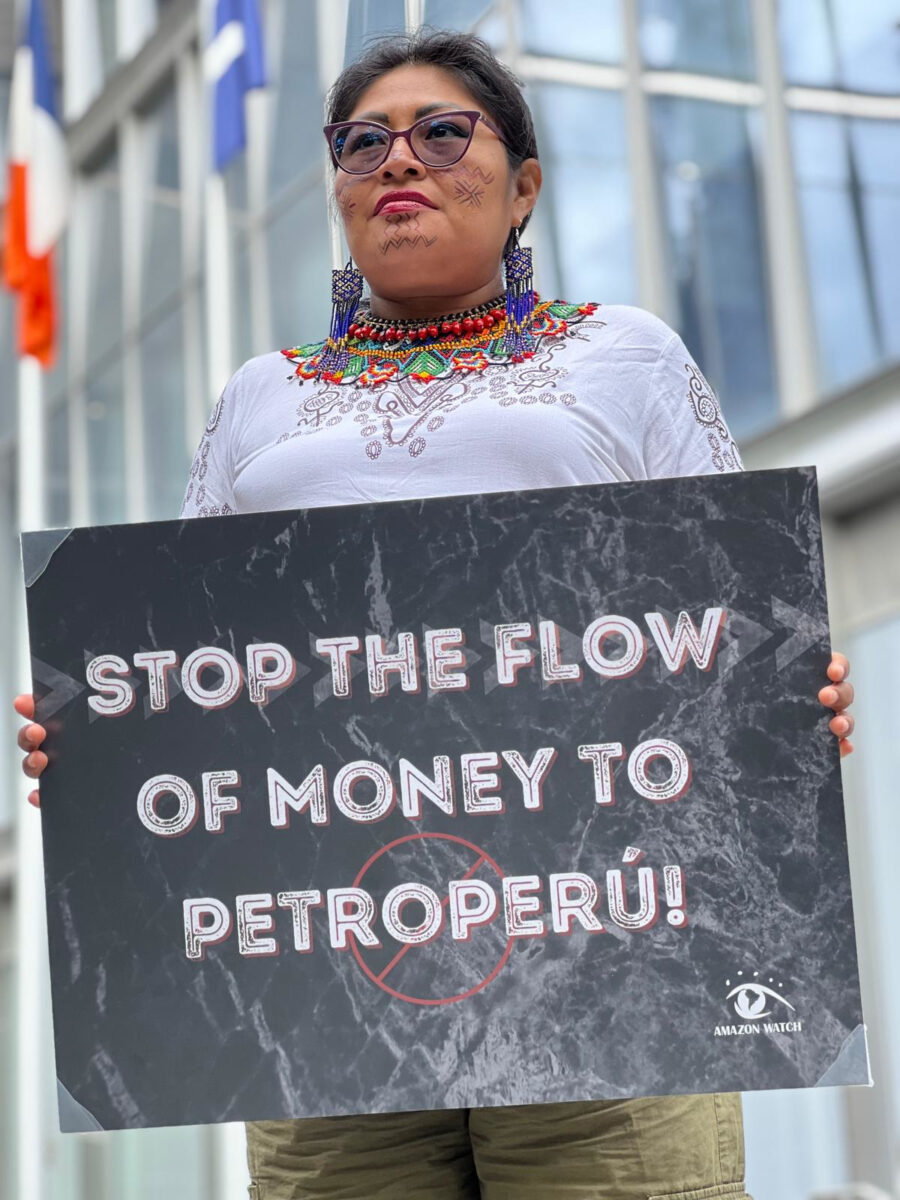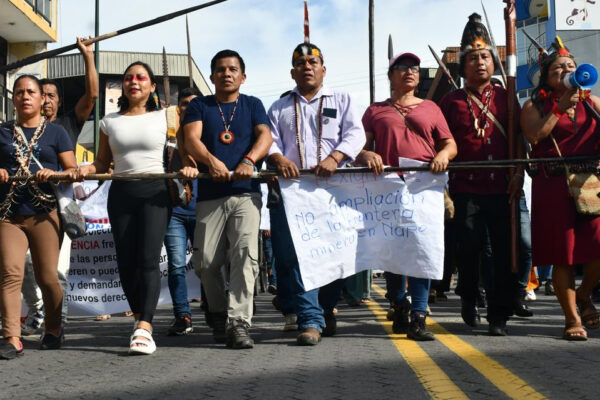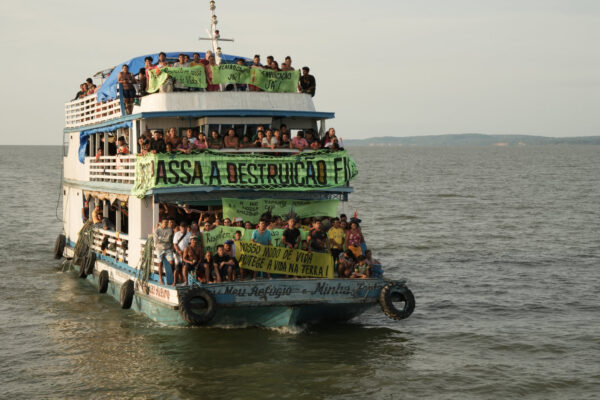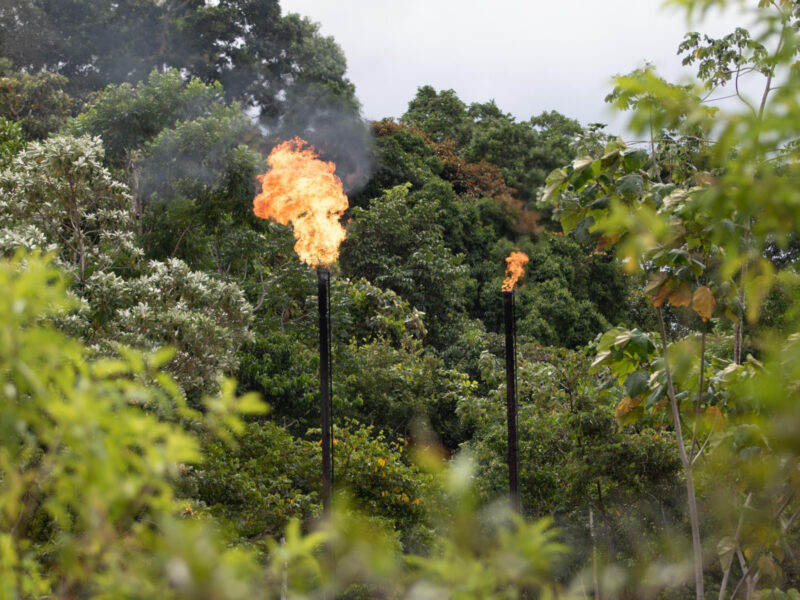Lima, Perú – State-run Petróleos del Perú S.A. (Petroperú) suffered a significant setback Thursday after failing to attract a single bid for the highly controversial Block 64, located in the heart of the north Peruvian Amazon.
The Indigenous Federation of Achuar Nationalities (FENAP), the Autonomous Territorial Government of the Wampís Nation (GTANW), and the Autonomous Territorial Government of the Chapra Nation (GTANCH) – whose ancestral homelands would have been directly affected by the proposed oil expansion – celebrated the news. The outcome follows decades of powerful, Indigenous-led resistance that has repeatedly blocked oil development in Block 64 since 1995.
Olivia Bisa Tirko, President of the Autonomous Territorial Government of the Chapra Nation (GTANCH) stated: “For the Autonomous Territorial Government of the Chapra Nation, Petroperú’s decision to cancel the tender for Block 64 is a great relief. However, we remain vigilant, knowing that Petroperú will likely continue seeking investors to exploit this block. For many years, we have stood alert and resisted every attempt by the Peruvian government and Petroperú to encroach on our territory. We are making a difference, and we will not stand idly by in the face of any activity that threatens our territories and our way of life.”

Elmer Kunchim, President of the Federation of Achuar Nationalities (FENAP) responded directly to the announcement: “For the Achuar people, oil means taking the life of living beings. We want to live healthy lives without environmental contamination. We respect our Mother Earth, our forest, river, and lakes. It is our market – we get everything from the forest. We do not want oil activity in our ancestral territory. Several times, we have defended this position before different companies and the government, which insists on Block 64. If a new company comes, we will tell them the same thing: We do not want their activity. They do not have a social license from FENAP, which represents 65 communities.”
Petroperú’s inability to secure a new major operator for Block 64 illustrates the heightened legal, financial, and reputational risks that continue to deter investment in Amazon oil development.
“This is a powerful victory for Indigenous resistance and frontline leadership in defense of the Amazon,” said Leila Salazar-López, Executive Director of Amazon Watch. “For decades, the Achuar, Wampis, and Chapra Peoples have led organized protests, community education, and international campaigns that have prevented oil expansion in Block 64, keeping some 55 million barrels of Amazon crude in the ground. Their leadership offers a model for us all. However, urgent action is still needed. Governments and institutions must immediately respond to their longstanding calls for full clean-up, environmental remediation, and compensation for historical pollution left behind. These harms underscore the urgent need for a just transition away from fossil fuels.”
Background
Since Block 64’s creation in 1995, multiple oil companies – including Occidental Petroleum, Talisman, and Geopark – have withdrawn and divested from the project due to sustained Indigenous opposition and the lack of social license to operate. The Peruvian government created Block 64 without obtaining the Free, Prior, and Informed Consent of Indigenous Nations, in clear violation of ILO Convention 169 and other national and international legal protections for Indigenous peoples.
Petroperú assumed control of Block 64 in 2022 and has faced growing scrutiny over its plans to expand oil operations, especially involving its 1,106 kilometer North Peruvian Pipeline (ONP). This aging pipeline, which cuts from Amazonian blocks to the north coast of Perú, has caused hundreds of oil spills over its nearly 50-year history, contaminating water, damaging ecosystems, and threatening the health and food security of Amazonian communities.
Despite these failures, Petroperú continues to push for expanded production to feed its recently-modernized Talara Refinery. The $6.5 billion upgrade has plunged the company into massive debt and placed it on the brink of insolvency. The refinery’s increased capacity now drives pressure for more drilling in contested Amazon and coastal regions – areas where communities are still demanding justice and remediation for past contamination.
Meanwhile, commercial banks that financed or facilitated lending for the Talara Refinery project are facing mounting criticism for supporting oil expansion in ecologically sensitive and conflict-prone areas.












